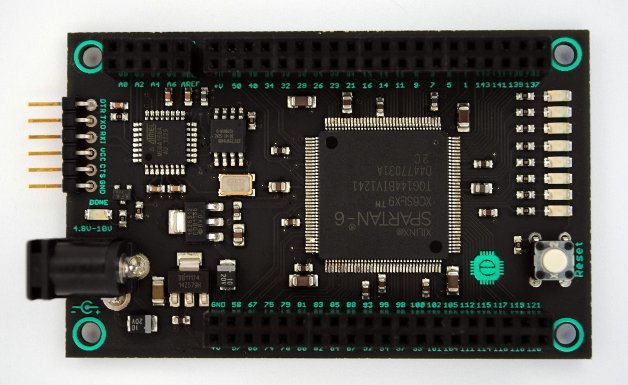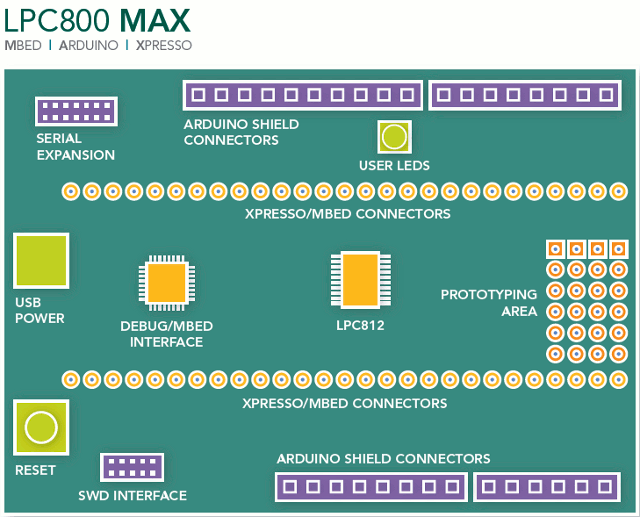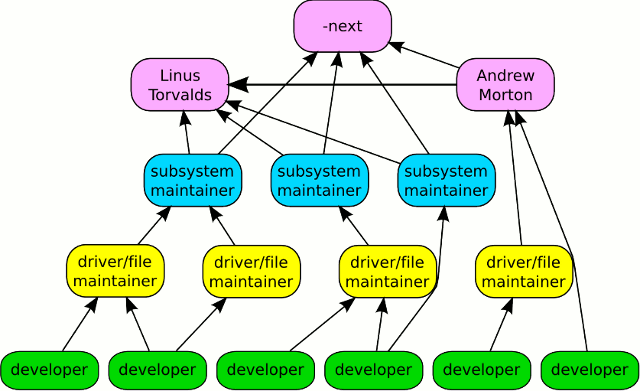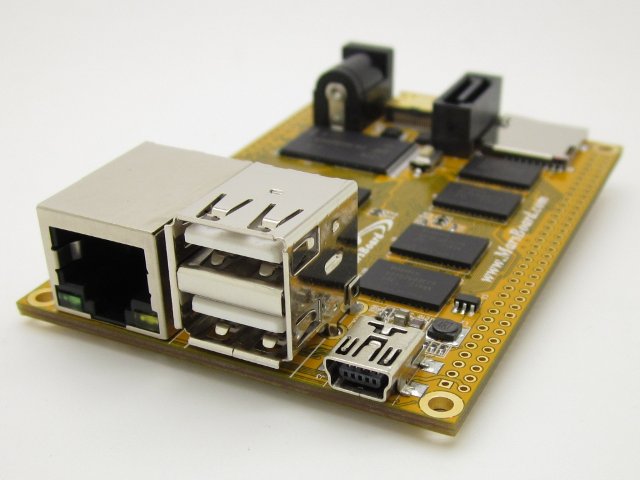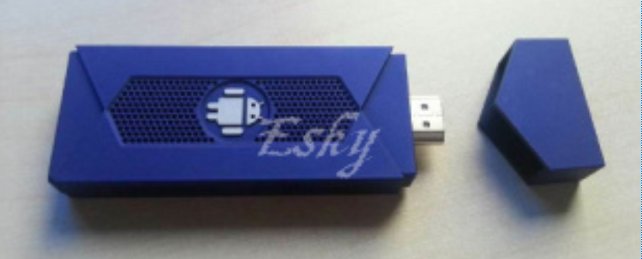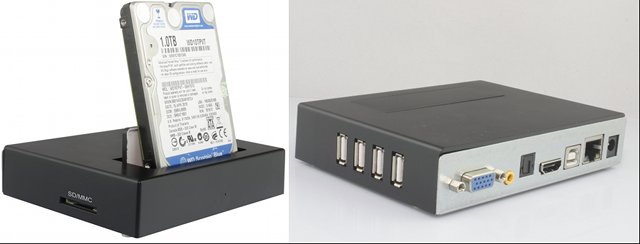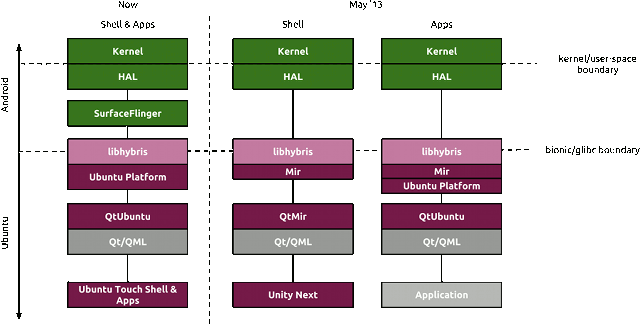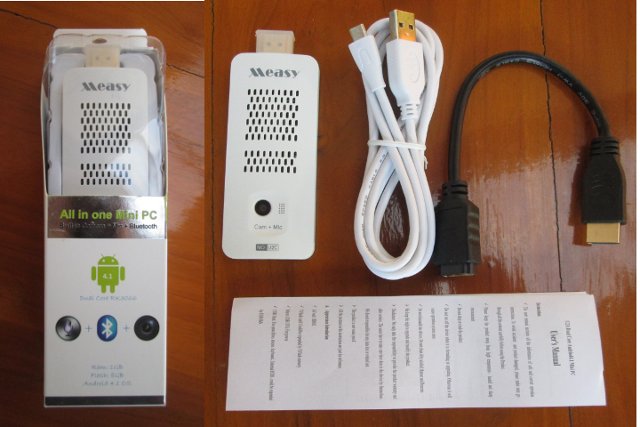Embedded Micro has started a kickstarter campaign to fund an FPGA board called “the Mojo”, “designed to be user friendly and a great introduction into digital design”. The board is powered by a Xilinx Spartan 6 FPGA that comes with over 9,000 logic cells, and will allow you to design digital circuits composed of a bunch of logic and, or, nor, etc… gates connected together to perform a specific task. Here are the features of “The Mojo”: Spartan 6 XC6SLX9 FPGA – 9,152 logic cells for your largest designs 84 general purpose digital IO pins (3.3V logic level) 8 analog inputs 8 user controlled LEDs A USB connection (new revision) to configure the FPGA and send receive data from your design On board voltage regulation (4.5V – 12V input, 3.3V and 1.2V outputs) 8 MHz on-board clock (can be multiplied internally by the FPGA) A reset button to be used in your designs […]
NXP LPC800-MAX Development Board Combines mbed, LPCXpresso and Arduino Connectivity
NXP unveiled LPC810 & LPC812 Cortex M0+ MCUs in November 2012, and more recently at Embedded World 2013, the company announced LPC810 and LPC812 microcontrollers availability together with LPC800-MAX, a development board based on NXP LPC812 compatible with mbed, Arduino and LPCXpresso headers which will be released in April 2013. LPC800-MAX board features: MCU – LPC812 Cortex M0+ in TSSOP20 package Onchip memory – 4KB SRAM and 16KB Flash. On-board debug interface (mbed USB onboard interface) on a LPC11U35 Top of board has Arduino compatible connectors, bottom of board has mbed and LPCXpresso connectors. Routing configurable via Switch Matrix. 3 color user LED, same one as on the LPC800 Xpresso A PCF8591 I2C ADC, mainly intended for use with the Arduino connectors 14-pin Serial Expansion Interface Connector compatible with several expansion modules from Embedded Artists 10-pin SWD connector for optional external debug probe User prototyping area This USB powered board will […]
Linaro Connect HK Greg Kroah-Hartman Keynote: “I Don’t Want Your Code!”
If you are a developer interested in getting your code into mainline, Greg KH keynote at Linaro Connect 2013 Hong Kong is probably worth a watch. In this presentation entitled “I Don’t Want Your Code! Linux Kernel Maintainers, why are they so grumpy?”, he first describes the large amount of patches they receive (7.28 patches per hour for kernel 3.8.0), gives some statistic about developers and companies involved with the kernel (about 20% is done by individuals), tells the audience they should submit the kernel code during SoC emulation/simulation stage, so that it’s accepted and ready to use when customers get the silicons (like Intel does), and quotes Intel and IBM executives saying “Working upstream saves time and money”. He then moves on what he does not want to see (and gets a lot): patch series with missing patches, email signature saying it’s confidential (since Linux development is done publicly, […]
$49.90 MarsBoard is Yet Another AllWinner A10 Development Board
After the tablet based Gooseberry and Hackberry boards, as well as Cubieboard and the upcoming A10-Olinuxino development boards, here’s another development board based on AllWinner A10 called the MarsBoard that looks very similar to the Cubieboard. Here are the key features of the board: SoC – AllWinner A10 Cortex A8 @ 1 GHz + Mali-400 GPU System Memory – 1GB DRAM Storage – 4GB Flash + 1x microSD card (up to 32GB) Video Output – HDMI Audio Output – 3.5mm stereo jack USB – 2x USB host port + 1x microUSB Connectivity – 10/100 M Ethernet SATA Connector Headers – 2x 2.0mm GPIO headers. (140 pins in total) Power Supply Requirements – 5V/2A Dimensions – 80mm x 55mm There’s also a 3.5mm jack but I’m not sure if it’s just for audio in or out, or for composite output. The website is still in construction (basically a modified copy of […]
UNUIGA U28 Android 4.1 mini PC Powered by AllWinner A31
I wrote about AllWinner A20 mini PC and media players yesterday, but Gabe, a regular reader and commenter, informed me that at least one quad core Cortex A7 mini PC is now available. UNUIGA U28 HDMI TV dongle is powered by AllWinner A31 SoC, and comes with 2GB RAM, and 8GB flash, as well as U03 wireless keyboard. The device sells for $101 including shipping in a new (without any feedback) shop in Aliexpress. Here are the specifications of this AllWinner A31 HDMI TV dongle: SoC – AllWinner A31 quad core Cortex A7 + PowerVR SGX544MP2 GPU System Memory – 2GB DDR3 RAM Storage – 8GB NAND Flash + microSD Connectivity – WiFi 802.11b/g/n + Bluetooth 2.1 USB – 1x USB 2.0 host port, 2x mini USB ports Video Output – HDMI Video Codecs – Mpeg1/2/4.H.264,VC-1,Divx,Xvid,RM8/9/10,VP6 Video Container Formats – MKV, TS, TP, M2TS, RM/RMVB, BD-ISO, AVI, MPG, VOB, DAT, ASF, […]
Cloudsto AllWinner A20 Android 4.2 mini PC and Set-top Boxes
AllWinner A20 is a dual core Cortex A7 processor destined to provide an easy pin-to-pin compatible upgrade for AllWinner A10 devices, and the first devices start to appear on the market with several Cloudsto offerings running the latest Android 4.2 Jelly Bean: A20 Media Stick – AllWinner A20 mini PC with 1GB RAM, 4GB Flash, HDMI output, 2x USB Ports and IR receiver. Price: 59.99 GBP ($90.88 US) A20 Media PC – AllWinner A20 set-top box with 1GB RAM, 4GB NAND Flash, onboard Ethernet, HDMI + RCA Video output, Optical output, and 2 x USB Ports. Price: 84.99 GBP ($128.77 US) Cloudsto Media PC PRO DRIVEDOCK – AllWinner A20 set-top box with 1GB RAM, 4 GB Flash, a 2.5″ SATA Hard Drive Bay, HDMI, VGA, and RCA video output and more. Price: 94.99 GBP ($143.92 US) The Media PC PRO DRIVESTOCK is the star of the show, and just looks […]
Future Versions of Ubuntu To Feature Mir Display Server Compatible With Android Graphics Drivers
The X server is getting old, and many developers complain it’s not an optimal solution anymore due to its (over) complexity, which was why Wayland was developed. However, it turns out Ubuntu will not use Wayland, but instead their own display server called Mir which will be used in all form factors from phones to desktops. Phoronix has provided a quick summary about the key aspects of Mir: Mir is a new display server being developed at Canonical and it is not based on X.Org or Wayland. Android graphics drivers will be supported. Existing DRM/KMS/Mesa/GBM (the open-source Linux graphics drivers) will work. Canonical is pressuring the binary blob vendors to make their drivers compatible. There will be support for legacy X11 applications through an integrated root-less X.Org Server. Canonical will natively support GTK3 and Qt/QML toolkits with Mir. Mir will be used for all form factors from Ubuntu Phones to […]
Measy U2C Gets Finless ROM and PicUntu Support
A few weeks ago, I reviewed Measy U2C, a Rockchip RK3066 mini PC with a webcam using the stock Android firmware. Since then other people received the device, and started to work on improving it notably by releasing a Finless ROM and providing instructions to install PicUbuntu on the device. Bob Finless is Freaktab.com administrator., and he has released popular custom ROM for the most commonly RK3066 mini PCs, and this time it’s Measy U2C turn! Measy U2C Finless ROM This first custom ROM is based on the latest ROM released on Geekbuying (March 1st, 2013) that fixes the CPU frequency, and let the device now achieve 9200 Antutu score. The Finless ROM brings the following improvements: Fully rooted with the latest SU and SUperUser.apk. All Google apps updated to latest, except Google Search. Deleted unusable and junk apps. Cleaned up the file system with tune2fs. Increased “system” space for […]


